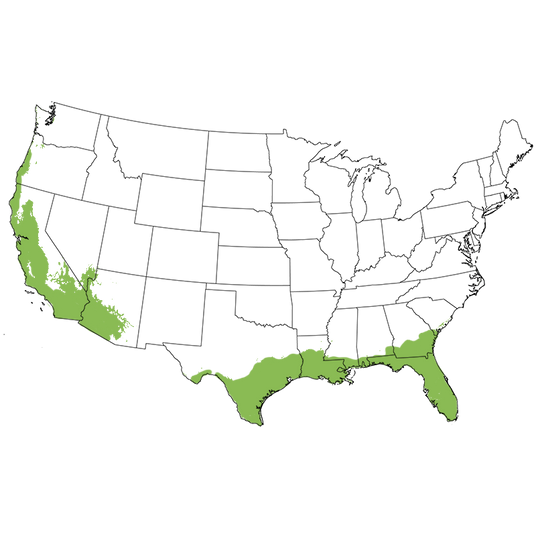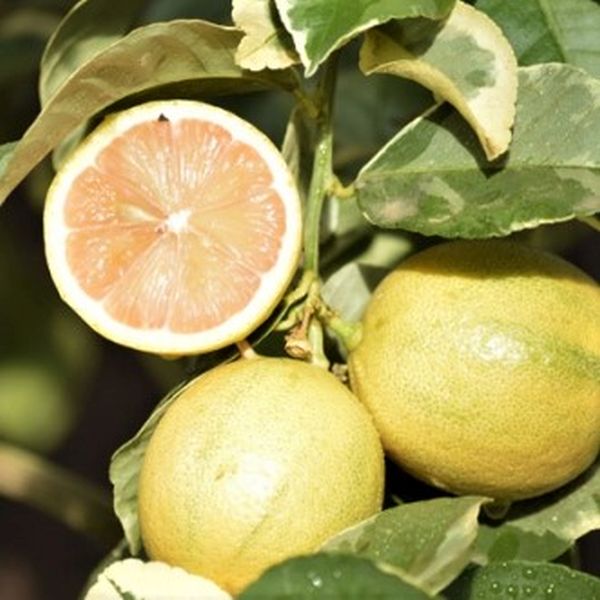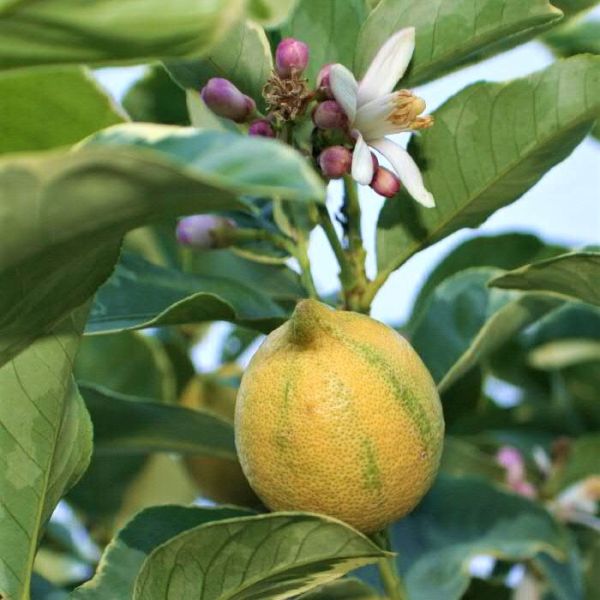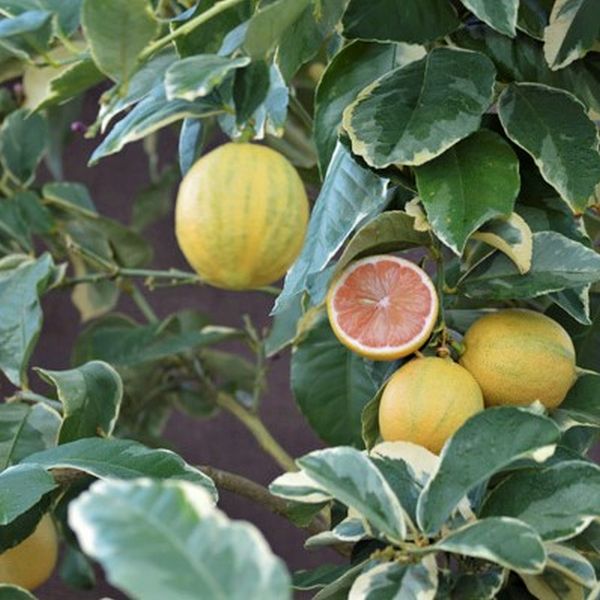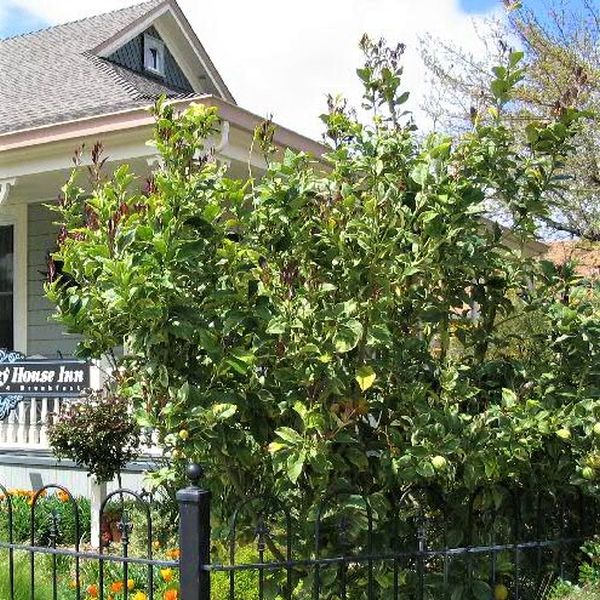Variegated Pink Lemon Tree
Citrus x limon Burm.f.'Variegated Pink
Planting & Care
Planting & Care
Delivery and Shipping
Delivery and Shipping
Preorder Shipping Schedule
We ship your plants when it's safe to transport them to your zone. Dates are estimated and subject to weather delays.
| Zone 3-4 | Week of March 30th |
| Zone 5 | Week of March 16th |
| Zone 6 | Week of March 2nd |
| Zone 7-12 | Week of February 23rd |
Shipping Rates
Ships in 3-4 business days • Tracking provided • Weather protected
| Under $50 | $9.99 |
| $50 - $99.99 | $14.99 |
| $100 - $149.99 | $16.99 |
| $150 - $198.99 | $24.99 |
| $199+ | FREE |
✓ Zone-specific timing • ✓ Professional packaging • ✓ Health guarantee

Plant Sentry™ Protected
Your order is protected by our compliance system that:
- Prevents restricted plants from shipping to your state
- Ensures plants meet your state's agricultural requirements
- Protects gardens from invasive pests and diseases
Ready for something very unique? The Variegated Pink Lemon Tree (Citrus x limon Burm. f. 'Variegated Pink') has distinctive green, white, and yellow variegated foliage, making it an incredibly ornamental tree! As if that isn't enough, the fruit is striped green and yellow and highlighted by bright pink flesh. These lemons have clear juice and a great acidic lemon flavor. It displays fuchsia-colored new growth!
Mid-sized trees that are gorgeous landscape plants and porch décor for any sunny position you have available! Variegated Pink is an excellent landscape tree, prized more for interesting variegated foliage than for fruit quality and quantity. You'll also enjoy the fragrant pinkish-white flowers!
Use these ornamental beauties throughout your home or landscape, pruning them to any size needed. The fruit can be used in beverages, desserts, marmalade and cooking to add that tart flavor to any dish!
Planting and Application:
If you live in a colder climate, simply plant them in a container. Bring your tree indoors near a sunny window, and let the intoxicating Citrus scent brighten your home during cold winter days. Porches and sunny patios and more all benefit from these smaller trees as potted Citrus! Boost curb appeal by planting one by your front entry!
As far as its ornamental qualities, the fragrant blooms and unique evergreen foliage are enough to establish the Variegated Pink Lemon as a beautiful specimen and focal point tree!
- Unique variegated fruit & Variegated evergreen foliage
- Delightful pink juicy flesh
- Fragrant pinkish-white blooms & Fuchsia new growth
- Easy to grow Container & In-Ground Ornamental
- Focal Point & Specimen Tree
#ProPlantTips for Care:
If given proper care, sun, fertilizer and well-draining soil, you will have a wonderful Citrus Tree that is simply beautiful. With its gorgeous variegated leaves and very fragrant white blossoms, this is the ultimate ornamental edible!
Citrus Trees are full sun plants, needing a minimum of 6 hours of direct sunlight a day. More sun means stronger growth, more flowers, and therefore more fruit! Preferring morning sun to dry the leaves of dew, these plants also like good air circulation to keep the foliage healthy.
Citrus need very well-drained soils that don't hold excess moisture. Mound up your planting area if you suspect poor drainage and container plants need deep planters with plenty of drainage holes. They also prefer their soil on the acidic side.
Let these plants dry out slightly between waterings and never allow their roots to sit in water. Plants in containers will not need much water during their dormant winter indoors. Citrus trees will not tolerate standing water, so please don't overwater.
Protecting Container Citrus From Cold
Although it's famous for growing in warmer regions, it can also thrive in colder areas as long as the tree is brought indoors prior to the first frost of winter.
If you're growing these tropical trees in the ground in the lowest of their favored growing zones, they need to be planted in a sheltered spot to avoid the worst of the chill. If a spot like that is unavailable, then you are better off planting in a large, deep container.
In borderline growing zones, begin slowly acclimating your tree indoors or into a protected location, eventually moving your tree inside in bright indirect sun for the winter if the temperatures in your area ever dip below that 40°F range. In spring, reverse this process and begin acclimating your tree to again be back out in the full sun all summer. This reduces stress and leaf drop.
- Hardy in zones 9-11. Below zone 9, plant in a container & bring it indoors for the winter
- Full Sun, Moderate Moisture & Fertile Well-Drained Soil
- Citrus Pruning is best done in late winter
- Set up a consistent Fertilizing schedule
Beautiful doesn't begin to cover how the Variegated Pink Lemon Tree appears! Unique fruit and foliage, pink fragrant blooms and rosy new growth - there is always something to admire throughout the year! Hurry and order your own before they're gone today at NatureHills.com!
-
Botanical Name
-
Growing Zones
-
Height
-
Width
-
Sunlight
-
Growth RateModerate
-
Flower Color
-
Leaf Color
-
Fall Color
-
FragrantYes
-
Bloom PeriodLate Spring, Early Summer, Late Summer
-
Does Not Ship ToAK, HI, ID, MT
